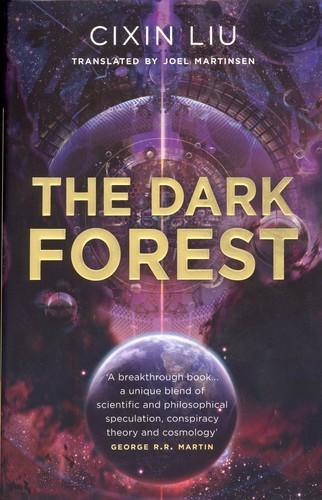zemoko a publié une critique de La forêt sombre par Cixin Liu
Beaucoup de longueurs, une structure du roman trop linéaire et une écriture vraiment aride m’ont empêché de vraiment apprécier ma lecture
3 étoiles
J’ai lu le premier tome en 2021… mais il faut croire que je n’étais pas pressé de lire la suite puisque je viens seulement de m’y atteler (et de me rendre compte que je n’avais pas rédigé de billet sur le tome 1, oubli réparé hier). Ce qui m’a sans doute convaincu de reprendre la trilogie, c’est l’adaptation Netflix du Problème à trois corps (adaptation très libre mais que j’ai vraiment bien aimé).
Ce 2e volume du Problème à trois corps se passe juste après la découverte de l’arrivée de la flotte trisolarienne venue envahir la Terre, et couvre les 4 siècles qui vont s’écouler avant leur arrivée. Faut-il se battre, sans espoir de victoire ? S’enfuir ? Mais qui partirait ? Qui resterait ? Vivre comme si ne rien n’était car pourquoi s’inquiéter de ce qui pourrait arriver dans quatre siècles ?
Les trisolariens ont un avance …
J’ai lu le premier tome en 2021… mais il faut croire que je n’étais pas pressé de lire la suite puisque je viens seulement de m’y atteler (et de me rendre compte que je n’avais pas rédigé de billet sur le tome 1, oubli réparé hier). Ce qui m’a sans doute convaincu de reprendre la trilogie, c’est l’adaptation Netflix du Problème à trois corps (adaptation très libre mais que j’ai vraiment bien aimé).
Ce 2e volume du Problème à trois corps se passe juste après la découverte de l’arrivée de la flotte trisolarienne venue envahir la Terre, et couvre les 4 siècles qui vont s’écouler avant leur arrivée. Faut-il se battre, sans espoir de victoire ? S’enfuir ? Mais qui partirait ? Qui resterait ? Vivre comme si ne rien n’était car pourquoi s’inquiéter de ce qui pourrait arriver dans quatre siècles ?
Les trisolariens ont un avance technologique majeure, avantage qu’ils se sont assurés de conserver en verrouillant les sciences fondamentales avec les intellectrons.
Face à l’omniprésence de ces intellectrons, et à l’impossibilité de conserver le moindre secret, l’ONU a décider de lancer le programme « Colmateurs » en confiant à quatre hommes la tâche d’élaborer un plan de défense, dans le plus grand secret puisque rien ne doit en être révélé, que ce soit à l’oral ou par écrit, pour empêcher les trisolariens d’en prendre connaissance. Trois sont des militaires, hommes d’État ou scientifiques reconnus, mais le dernier, Lio Ji, sociologue et astronome chinois. est un parfait inconnu.
L’intrigue est toujours aussi complexe, mais j’ai eu plus de mal à me projeter, j’ai trouvé certains passages vraiment longs et je n’ai pas vraiment apprécié le style, trop aride à mon goût.
J’ai, par contre, été séduit par les thématiques scientifiques. Le premier tome s’appuyait sur des analyses scientifiques très concrètes, ce qui m’avait plu, mais j’ai vraiment apprécié la relecture du Paradoxe de Fermi par Liu Cixin.
Là où Fermi se contentait de s’interroger sur l’absence de contact avec des civilisations extraterrestres…
"S'il y avait des civilisations extraterrestres, leurs représentants devraient être déjà chez nous. Où sont-ils donc ?"
… Liu Cixin va plus loin en appliquant des principes sociologiques aux civilisations galactiques, et en comparant l’univers à une forêt sombre dans laquelle chaque civilisation est un chasseur, qui se déplace silencieusement pour éliminer toute présence afin de ne pas lui-même devenir une proie. Liu Cixin formalise ces principes sous la forme de deux règles très simples exprimées par Lio Ji :
"Premièrement : la survie est la nécessité première de toute civilisation ; deuxièmement : une civilisation ne cesse de croître et de s'étendre, tandis que la quantité totale de matière dans L Univers reste constante."
Beaucoup de longueurs, une structure du roman trop linéaire et une écriture vraiment aride m’ont empêché de vraiment apprécier ma lecture… Je pense que je lirais tout de même le troisième tome… mais pas tout de suite. J’ai besoin de faire une pause, mais je serais sans doute curieux de terminer la trilogie d’ici quelques temps.



